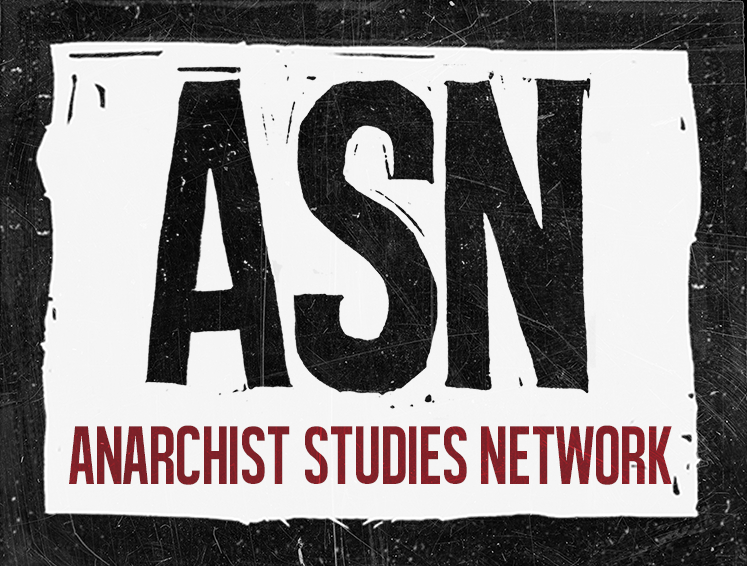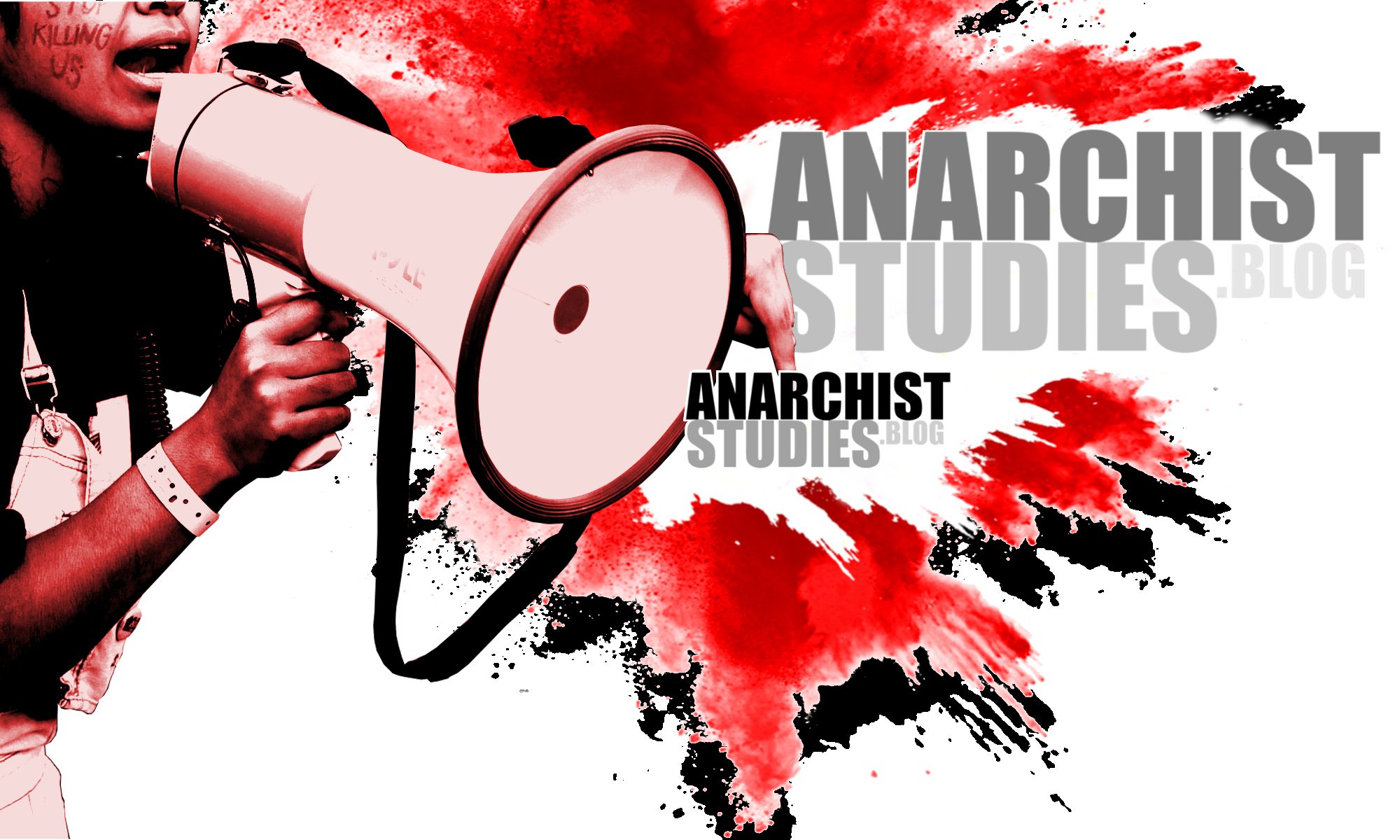by Luke Ray Di Marco Campbell
9th May 2023

The first of the Anarchist Studies Network’s (ASN) experimental ‘Anarchist Activism in Focus’ sessions took place on Tuesday the 4th of April 2023. The initiative was born out of discussions at the 7th Anarchist Studies Network Conference (2022), and the series is part of a commitment from the ASN to ‘explore alternative ways of presenting academic research [via] a series of micro-events to “prefigure” different presentation formats’. The inaugural meeting featured Nora Ziegler and Frankie Hines as discussants, with Peterson Silva coordinating the event, whilst I (Luke Ray Di Marco Campbell) served as the host for this first iteration – and it is from that vantage that I offer my own reflections on the event.
The session started in a fairly standard way: the host briefly detailed the format, noting that, unfortunately, we would not have the live captions we had hoped to, and encouraged attendees to let us know if there were any actions we could take to enable them to better engage in the session. Following quick introductions from each of us in-turn, we progressed through each of the discussant’s works in dialogue (Ziegler brought her paper ‘Power Relations in Grassroots Organising: An Anarchist Dialectics’; followed by Hines’ ‘Beyond the Critique of Complicity: In Defence of Purity?’). The traditional monologuing of most academic presentations, in which an individual talks at the attendees, produces a largely unidirectional and hierarchical dynamic, resulting in rigid roles where it’s considered somewhat rude and disruptive to interject. Whilst still recognising levels of expertise in their respective topics via practice, research, or lived experience, the dialogical approach should, in premise, permit us to enter into an alternative relationship (less speaker to audience; more lead discussant[s] and active participants).
The digital space brought unique challenges for an in-conversation style event. In my day job as a university lecturer I’m hyperconscious of how challenging it can be to talk to a digital room full of participants who have their cameras switched off. I also recognise that some would-be discussants may find the discursive approach unsettling too, perhaps even more so than the trepidation and anxiety of presenting in a traditional presentation format. As a host, facilitator, or educator, I would ordinarily mute myself when others begin their presentation. This dialogical format presented something of a dilemma – is it best practice to silence myself (literally muting my microphone) to allow the discussant the maximum space to speak? Alternatively, is audible positive affirmation an important part of this specific format? Perhaps we need time and space to settle into moments of silence whilst discussants formulate measured responses to questions posed to them, or need to work towards a kind of comfort in the verbal debris that is produced as we formulate thoughts.
I’m incredibly grateful to have had the opportunity to act as the assigned ‘mediator’ – arguably more of a host role than a facilitator, given the conversational nature of the event. But I’m conscious that these reflections come from a single privileged position within the space. I’m also fully aware that I was able to take advantage of staying late at my workplace to ensure a quiet environment, and that was made possible thanks to my partner taking the lead with our childcare for the evening.
The position of the ‘host’ role enabled me to speak directly with two people engaged in topics of interest to me. Ziegler’s work in particular, and her Anarchist Essays podcast episode, has impacted on my own thinking around religion, action, and space. I’ve spent time recently working through Dorothy Day’s texts and legacy (Day was a co-founder of the Catholic Worker movement in the US – see Day, 1963; Jordan, 2002), whilst also exploring the opportunities and limitations of utilising spaces owned by religious bodies rather than the state through my own practice with an anarchist-influenced community development organisation in Edinburgh (see Campbell, 2020). So, it was an incredible opportunity for me, personally and professionally, to discuss the ‘radical hospitality’ Ziegler (2023) has been involved in. However, it was a unique remit of the moderator for the first event in this series to not read the papers in advance – envisioned as a means for fostering more sincere dialogue. On reflection, this could throw off discussants, as the line of questions generated from the abstracts-only could – and, perhaps, did – lead the dialogue down other avenues than the panellists would be likely to explore in a more traditional format where they dictate the direction of conversation. This is not to suggest for a moment that what was explored was not interesting, merely that it diverged from where any of us (organiser, host, or discussants) expected it to go.
I found the connections established across the papers fascinating, largely centring on an argument of pragmatism versus ideological purity in anarchist and anarchist-influenced settings, whilst the contrast between the grassroots focus on the London Catholic Worker (Ziegler) and the contemporary US text-based study (Hines) allowed us to approach the broader discussion from multiple angles, both theoretical and action-based. In my own practice and research, I place significant focus on how contextualisation situates, and even limits our work, actions, and capacity. Both contributors shared their ‘journeys into anarchism’ (covering thought and action), and this felt essential to relaying those contexts.
The insights offered to us by Ziegler were incredibly useful in communicating the setting in which her understandings of radical hospitality, power dynamics, and citizenship were formed. Ziegler’s openness about her struggles after some negative formative experiences with anarchists afforded us greater insights into the uniqueness of how she became involved with the London Catholic Worker, hitchhiking her way down to the London Radical Bookfair and then becoming a live-in volunteer. So too Hines’ insights into a diverse range of contemporary US anarchist texts, and how frequently the examples he explored advocated a particular way of living ‘an anarchist life’ that can leave us feeling disconnected or ideologically tainted when we cannot achieve that ‘purest’ form (one such example he raised was CrimethInc.’s Evasion (2001)). Hearing how Hines came to anarchism, in part, through his involvement with the student occupations in Sussex, was similarly useful in framing his contributions and how he came to his chosen topic. Thank you to both for affording us these insights and background.
The observations and parallels we were able to draw out across situations of precarity (living or employment-based) extended to the conditionality of citizenships in the UK context, as well as to the burnout many activists and other radically-inclined actors experience from living within the very struggles we engage in. This latter component is incredibly common amongst radicalised working class persons, and class across anarchist movements throughout Europe was something raised by a participant during the open dialogue section of the evening. This could lead to more directed conversations on that theme – we endure intersectional but also distinct struggles (racism, transphobia, homophobia, ableism, etc.).
Relationships were emphasised as integral to our survival and the condition of our mental health, but space for listening and for dialogue are evidently essential to fostering sincere forms of solidarity and action (rather than conditional allyship). Solidarity is a struggle and, hence, mutual aid, care, and compassion are pivotal if we are to make progress in that pragmatic sense – for example, the discussion focused on how we should support someone to gain the safety of secure residency status as a means of addressing insecurity. It’s in recognising the importance of understanding and being guided by the needs of those around us – rather than sticking rigidly to an ideological purism that leaves others in precarious circumstances – that we will work to remove borders, to abolish prison systems, and to create the better world that we fight for.
I think it was also highly useful to raise materials of interest and significance from different ‘traditions’, including those of Frantz Fanon (1986), Alexis Shotwell (2016), AK Thompson (2010), and Paulo Freire (1970), as well as the numerous former Black Panther Party activists named, many of whom progressed through the Communist Party of the United States of America before becoming outright anarchists – amongst them Angela Davis (2003), Mumia Abu-Jamal (2023), and Kuwasi Balagoon. Signposting to useful resources is a vital element of supporting each other, whilst the exposure to this array of materials allows us to further refine our own understandings as we arrive at positions that make sense to us. I hope these will be useful to those of us in attendance, but also to any readers of this blog.
Drawing to a close, this presentation style does require buy-in to the dialogical approach, but, as has been stated from the onset, we are working within an experimental format. All insights help us to co-create something that works, and though this contribution can only serve as a starting point for those discussions, I’m highly encouraged by the collaborative drive to experiment with forms of academic presentation. Certainly, feedback from participants (the organising group and the attendees) suggests that access to the papers would enable us to engage and contribute more directly. As such, whilst the ambitions of fostering a more sincere form of dialogue is to be commended (breaking with traditional formats of monologues and direct question, answer; question, answer), this element, I believe, needs to be revised. Though the dialogue was genuine and organic (including moments of silence and contemplation), greater familiarity with the papers would ensure the discussions manage to cover the core points that the presenters hoped to get across.
So too, there are insights to take from the format. Continuing with the online format allowed participants to join from across the world (and this is a practice many of us became familiar with during Covid, of course). It fostered a gentle environment in which some people attended whilst enjoying their breakfast, and others had their kid(s) sat on their knee. These are some of the advantages over hosting the event in a single, physical venue or trying to navigate hybrid in-person/online approaches. Fortunately, connectivity was not an issue – though one or two of the participants dipped in and out, during the dialogues and cross-participant discussions none of us – as far as I know – experienced connectivity issues, enabling the conversations to flow.
Going forward, whilst the programme brings together international audiences (with participants joining from Scotland, England, the US, France, and Brazil during this first session), the advert for the series states that the organisers are seeking volunteer British Sign Language interpreters. Anyone interested is encouraged to email anarcademia23@riseup.net
My thanks to Peterson for coordinating this initial session, to Nora and Frankie for their participation, and to everyone who attended the event and took part in the dialogue.
References
Abu-Jamal, M. (2023) Prison Radio. Available at: https://www.prisonradio.org/correspondent/mumia-abu-jamal/
Anarchism Research Group (2023) Essay #52: Nora Ziegler, ‘Radical Hospitality’. YouTube. Available at: https://www.youtube.com/watch?v=9n9JRw6nyLU
Balagoon, K. (n.d.) Anarchy Can’t Fight Alone. The Anarchist Library version. Available at: https://theanarchistlibrary.org/library/kuwasi-balagoon-anarchy-can-t-fight-alone
Campbell, L.R. (2020) A Call for Solidarity: Community Support for the Tollcross Community. Concept: The Journal of Contemporary Community Education Practice Theory, vol. 11 (supplement), pp. 1-8.
CrimethInc. (2001) Evasion. The Anarchist Library version. Available at: https://theanarchistlibrary.org/library/crimethinc-evasion
Day, D. (1963) Loaves and Fishes: The Inspiring Story of the Catholic Worker Movement. New York: Harper and Row.
Davis, A. (2003) Are Prisons Obsolete? Anarchist Library version. Available at: https://theanarchistlibrary.org/mirror/a/ay/angela-y-davis-are-prisons-obsolete.pdf
Fanon, F. (1986) Black Skin, White Masks. London: Pluto Press.
Hines, F. (2023) Beyond the Critique of Complicity: In Defence of Purity?
Jordan, P. (2002), Dorothy Day: Writings from Commonweal (1929–1973). Collegeville, MN: Liturgical Press.
Shotwell, A. (2016) Against Purity: Living Ethically in Compromised Times. Minneapolis, MN: University of Minnesota Press.
Thompson, A.K. (2010) Black Bloc, White Riot Anti-Globalization and the Genealogy of Dissent. Chico, CA: AK Press.
Ziegler, N. (2022) Power Relations in Grassroots Organising: An Anarchist Dialectics. Anarchist Studies, vol. 30, no. 2, pp. 55-78.
